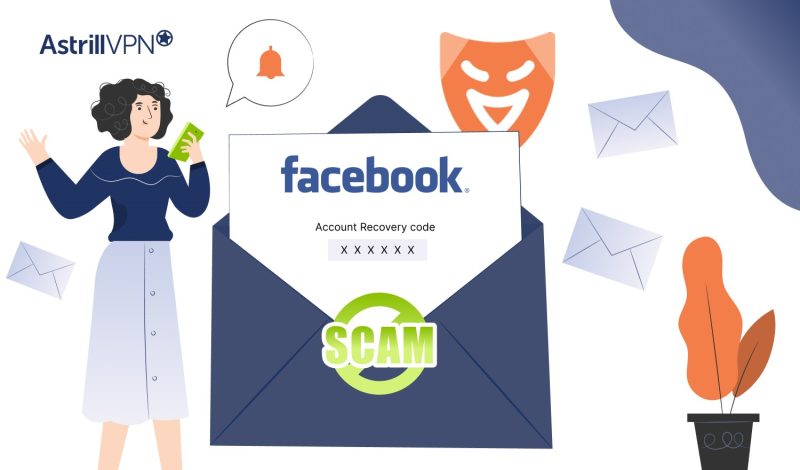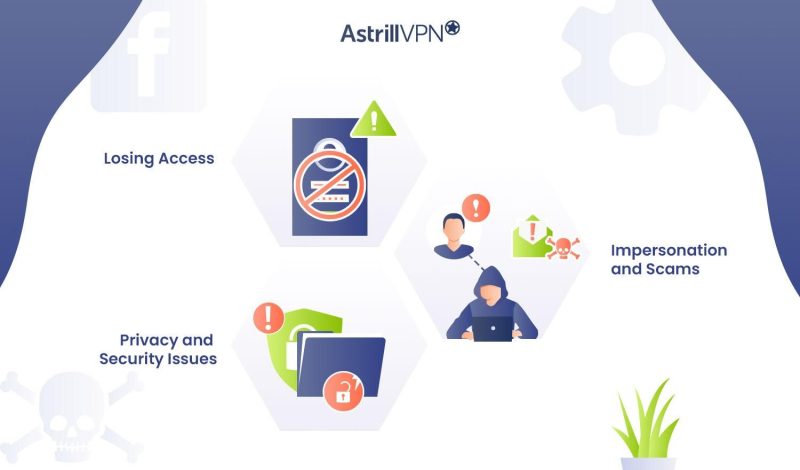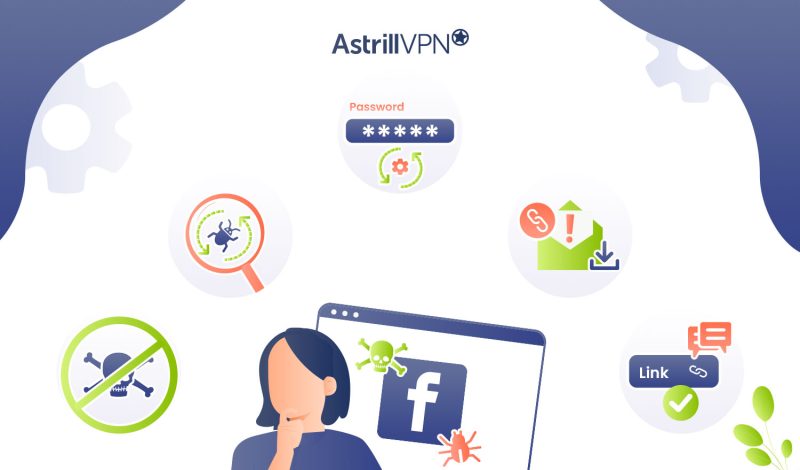Got a Fake Facebook Account Recovery Code Email: How to avoid this scam?

Bisma Farrukh

If you’re just minding your own business when an email pops into your inbox from Facebook and the subject line says your Facebook account’s recovery code is inside. Scammers are getting craftier with phony account recovery emails. If this sounds familiar, you’re not alone. Lots of folks are getting duped by fake Facebook account recovery code emails lately. But don’t worry, we’ve got the scoop on spotting and stopping these sneaky phishing attempts. Keep reading to learn how to tell if your Facebook account recovery code email is legit or a scam. We’ll break down exactly what to look for so you don’t fall for it.
Table of Contents
What Are Facebook Account Recovery Code Email Scams?
Facebook recovery email scams are misleading emails claim that someone requested an account recovery code for your Facebook profile. They insist you need to verify your identity by clicking a link or downloading an attachment. Don’t fall for it! This is a scam to steal your login info.
How They Work?
Scammers send emails posing as Facebook to trick you into giving them access. The messages often look legit with Facebook’s logo and mention details like your username. Facebook will never ask for sensitive data like passwords or account recovery codes via email.
What to Watch Out For?
Be wary of messages urging you to act quickly or click suspicious links. Legit companies don’t demand sensitive info this way. Also, check the sender’s address. Facebook’s real email is facebookmail.com. Anything else is an imposter.
What to Do?
Delete the message immediately. Never click links, download attachments, or reply with personal details. Be sure to enable two-factor authentication on your Facebook account to add an extra layer of security. Look out for recovery code scam emails. Stay vigilant so that your account will remain safe from these sneaky thieves.
How to Spot a Facebook Password Reset Scam?
Here are some common types of fake Facebook recovery code emails you might receive:
1. Emails claiming to be from Facebook’s “security team.”
The email says something like “Our security team has detected suspicious activity on your account. Click here to verify your identity and secure your account.” There are no actual security issues. It’s a scam to steal your info.
2. Phishing emails designed to look like a legitimate password reset
They’ll include your actual username to make it seem real. But the links will send you to malicious sites instead of Facebook.com.
3. Messages claiming to” reactivate” your account
Messages that say you need to “reactivate” your account by providing personal details or clicking a link. Facebook does not contact users this way. Any email claiming you need to “reactivate” your account is fake.
4. Emails with subject lines like “Your Facebook password recovery code” scam
The goal is to trick you into entering your login credentials on a fake Facebook login page. Ignore these messages and delete them immediately.
5. ‘Your Account Recovery Code’
The email subject reads something like ‘Your Facebook Account Recovery Code’ or ‘Reset your Facebook password’. It looks legit but wasn’t actually sent by Facebook. The email claims you requested a code to recover access to your Facebook account. It provides a code and link to enter it. Don’t click! This is a scam to steal your password.
6. ‘Your Facebook password reset request’
The email claims you requested to reset your Facebook password. It includes a link to ‘reset your password’ or ‘verify your identity’. Clicking the link will take you to a fake Facebook login page to steal your password. Facebook will never ask for personal information or your password via email.
Facebook works hard to prevent phishing and spam, but some still slip through the cracks. When in doubt, log in to Facebook directly and change your password. Staying vigilant is the best way to outsmart the scammers and keep your account safe.
Read Also: What to do if you get scammed on the Facebook marketplace?
How the Facebook Account Recovery Code Scam Work?
The scam usually starts with an email claiming that someone, usually “Facebook Support”, has requested an account recovery code for your Facebook profile. The email will say that if this wasn’t you, to click a link to cancel the request.
Don’t click that link!
It’s a trick to get your login details. Facebook will never ask for your password or account recovery code via email. Clicking the link can install malware on your computer to steal your data or take over your Facebook account.
How to spot the scam?
Look for poor grammar, spelling errors and an urgent tone in the email. Legitimate companies like Facebook have professional correspondence. The sender’s email address may look official but check closely, it’s often spoofed.
What to do?
Delete the email immediately. Never click links or download attachments from unsolicited messages. Go directly to Facebook.com and login to your account to check for any unauthorized access. You may need to update your password and enable two-factor authentication for added security.
Staying vigilant against phishing emails and malicious links will help keep your Facebook account safe from compromise. If anything ever feels off, it’s best to err on the side of caution. Legitimate companies will understand your concern for privacy and security.
Facebook Password scams in 2023
In 2023, hackers and scammers continue to target Facebook users with fraudulent emails claiming to be from Facebook to steal passwords and personal data. These malicious actors send emails falsely claiming that you requested a password reset on your Facebook account. The email contains a link to “reset your password” which actually leads to a fake Facebook login page.
These password reset scams are common tactics used by cybercriminals, so remain vigilant and skeptical of any unsolicited emails claiming to be from Facebook. If something seems suspicious, it’s best to just delete the email and not interact with it.
Unsuspecting users then enter their email and password on this spoofed page, allowing the scammers to access their real Facebook account. These phishing emails are designed to look authentic but have telltale signs they’re fakes.
Some things to watch out for:
- Messages are riddled with spelling and grammar errors. Legitimate companies like Facebook carefully proofread all communications.
- Strange sender email addresses that don’t match Facebook.com. Scammers often spoof the “From” address to appear as Facebook but the reply-to email is different.
- Links that don’t lead to Facebook.com. Hover your mouse over any links without clicking to see the actual URL in the status bar at the bottom of your browser window.
- Requests for sensitive info like your password, credit card number or social security number. Facebook will never ask for this data via email.
- A sense of urgency to act quickly. Scammers want you to click without thinking. Take your time and double check.
What to Do if You Get a Suspicious Facebook Code Email?
Stay calm, and don’t click any links
The first thing to do is remain calm. Do not click any links or download any attachments in the email. These could contain malware or steal your account information.
Check the sender’s email address
Carefully check the sender’s email address. Facebook will only send account recovery emails from “security@facebookmail.com.” Anything else is a scam. Delete the email immediately.
Log in to Facebook and check your account
Log in to Facebook from your browser and check if there are any unrecognized devices or apps connected to your account. Change your password right away just to be safe. Enable two-factor authentication for an extra layer of security.
Report the scam to Facebook
Forward the suspicious email to Facebook at spoof@facebook.com and reportphishing@facebook.com. Include the entire email message with headers intact. Facebook uses reports from users to track down scammers and spammers.
Be on alert for follow-up phishing attempts
Scammers may try again with a different tactic to gain access to your account. Continue to be wary of unsolicited messages and links claiming to be from Facebook. Never provide personal information or click links in these communications.
Staying vigilant and taking the proper precautions can help keep your Facebook account safe from phishing scams and spam. Don’t let a seemingly legitimate-looking email catch you off guard. Always double check before clicking or sharing any information.
Dangers of Having Your Facebook Account Hacked

Losing Access
Once hackers gain access to your Facebook account, one of the first things they’ll do is change your password to lock you out. Now they have full control of your account and you can’t do anything to stop them. They may even enable two-factor authentication to make it nearly impossible for you to recover your account.
Impersonation and Scams
With control of your profile, hackers can impersonate you and scam your friends and family. They may send messages asking for money, gift cards, or sensitive information while pretending to be you. Your contacts likely won’t suspect it’s not really you messaging them. Hackers can also post to your timeline, send friend requests, and join groups in your name.
Privacy and Security Issues
Hackers have access to all your private information like messages, photos, birthday, address, and more. They can see your friends list, groups you’ve joined, and events you’re attending. They may steal your personal data or use it for identity theft. They can also install malware on your account to spread viruses and spy on your contacts.
The dangers of having your Facebook account hacked are very real. Be extremely cautious of unsolicited messages or links asking for your account info or password. Never share sensitive data or click links from unknown or untrusted sources. Monitor your account regularly for any unauthorized access and enable two-factor authentication for an added layer of protection.
Is Your Device Infected?
Chances are, if you received a fake Facebook account recovery email, your device may have been compromised. Malicious actors often spread malware, like viruses, worms, and trojans, to gain access to people’s accounts and personal information.

- Check for signs of infection on your device like slower performance, frequent crashing apps, pop-up ads, or unauthorized access to your accounts.
- Run a reputable antivirus scan on your device to detect and remove any malware.
- You should also change your account passwords immediately, enable two-factor authentication if available, and monitor accounts closely for unauthorized activity.
- Be very wary of clicking links or downloading attachments in unsolicited messages. Phishing emails and malicious websites are common infection vectors for malware.
- Only open links and attachments from trusted senders. If something looks off about a message from a friend or family member, contact them to verify they sent it before engaging with the content.
By taking action right away, you minimize the damage from malware and reduce the risk of further account compromise or identity theft. While technology helps connect us, it also provides new avenues for scams and fraud.
How to Stay Safe Online by using AstrillVPN?
To protect your privacy and security online, using a virtual private network or VPN is key. A VPN like AstrillVPN encrypts all your internet traffic and hides your online activities. This prevents hackers, internet service providers, and governments from seeing what you do on the web.
When connected to AstrillVPN, your real IP address is hidden behind one of their servers in another country. All your online activity like emails, social media, streaming video, everything will appear as though it’s coming from that location. This allows you to bypass geo-blocks and censorship, keeping you anonymous and secure.
AstrillVPN has server locations worldwide so you can choose an IP in the US, UK, Australia or beyond. Their apps are easy to set up and use on Windows, Mac, Android and iOS. With military-grade encryption and a strict no-logging policy, AstrillVPN keeps your online life private so you can share and search freely.
For an added layer of protection, enable AstrillVPN’s StealthVPN mode. This obscures the fact you’re even using a VPN, hiding your activity from VPN detection systems. AstrillVPN’s useful features, affordable pricing, and commitment to privacy make it a great choice for staying safe and secure online. Sign up today for peace of mind that your online activities and personal information remain private.
FAQs
No, emails from security@facebookmail.com are not legitimate. Facebook will never ask for your password, account recovery codes, or send you an unsolicited account recovery email.
It doesn’t matter because Facebook does not send account recovery code emails. Any message claiming to be from Facebook asking for your login or account info is a scam.
Unfortunately, no. Scammers often claim there was a login to your account from an unrecognized device to trick you into providing sensitive data.
Conclusion
Don’t sweat it if you get one of these emails. Just delete it and move on. The scammers are just phishing for people who will fall for their tricks. As long as you have a strong password and two-factor authentication enabled, your account will stay secure. And if you ever do lose access for some reason, go through proper Facebook channels to recover it, not some sketchy email. Keep your personal info protected, your password strong, and your security settings locked down tight. With a little common sense, you can keep your Facebook account safe from scams.

No comments were posted yet